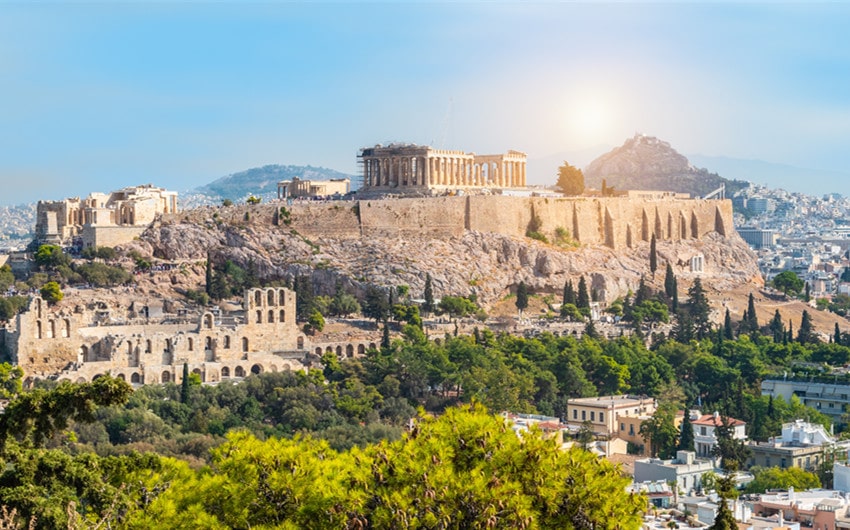20 Powerful Reasons to Travel to Greece
Greece doesn’t try to impress you—it simply is. It’s a country that blends ancient echoes with everyday rituals, where olive trees grow between ruins and salt clings to your skin long after you’ve left the sea. People think of Greece and picture sunsets in Santorini or ruins in Athens, but that’s just the cover. The real story runs deeper. Here are 20 honest, layered reasons to travel to Greece—beyond the beaches, beyond the brochures, into the soul of a country that still knows how to slow time.
1. The Light Changes Everything
Greece has a quality of light you won’t find anywhere else. It’s not just brightness—it’s shape, warmth, and color. In the early morning, the glow is golden and soft. At sunset, it’s theatrical, transforming white buildings into glowing embers. Painters come here for the light, but you don’t need a canvas to be moved by it. You just need to sit still and let it wash over you.
2. Each Island Is Its Own World
Greece has over 200 inhabited islands, and each one has a different personality. Santorini’s drama. Paros’ simplicity. Crete’s rugged pride. Ikaria’s slow rhythm. Hydra’s no-car quiet. You could spend years exploring and never exhaust the contrasts—different dialects, food traditions, architecture, even music. Choose your island like you’d choose a friend: not for popularity, but for connection.
3. Food Isn’t Just Food—It’s Philosophy
Greek food is about balance. Freshness over excess. Quality over complexity. Meals are slow, shared, and rooted in the land. Tomatoes taste like sun. Olive oil is sacred. Even street food—souvlaki wrapped in paper—feels lovingly made. You don’t eat on the go. You sit, you talk, you take your time. In Greece, food isn’t fuel. It’s a reason to gather.
4. Ancient History Feels Alive
The ruins in Greece aren’t just relics—they’re reminders. You walk through temples that still seem to breathe. You hear stories about gods and philosophers and wars, then realize the locals still reference them casually. Mythology isn’t in the past—it’s embedded in how Greeks think, speak, and see the world. And standing in places like Delphi or Epidaurus, you feel like time folded in on itself.
5. The Sea Is Medicine
The Aegean and Ionian seas are not just scenic—they’re healing. The water is clear, mineral-rich, and so buoyant you barely need to swim. Greeks don’t treat the sea as a luxury. It’s where they go to clear their minds, cure backaches, solve arguments. You’ll understand why after one long, quiet float with the sun on your face.
6. Hospitality Isn’t a Service—It’s a Way of Life
Xenia—the ancient concept of hospitality—isn’t marketing fluff. In Greece, being a guest comes with unspoken rights and responsibilities. People feed you without being asked. They offer coffee, conversation, or directions without expecting payment. In villages, strangers feel like relatives. In cities, they still want to help. It’s not a performance. It’s cultural muscle memory.
7. Mountains That Hold Stories
Everyone talks about the islands, but Greece’s mountains are stunning, wild, and often overlooked. In places like Zagori, Taygetos, and the Pindus range, you’ll find stone bridges, alpine villages, and shepherds who still live seasonally. Hiking in Greece isn’t just scenic—it’s cultural immersion. The trails are old. The air smells of pine, sage, and history.
8. Music That Makes You Feel Everything
Greek music carries both joy and longing in the same note. Bouzouki strings can sound celebratory or mournful—sometimes in the same song. You’ll hear music in tavernas, in festivals, and drifting from balconies late at night. Even if you don’t understand the words, you’ll understand the feeling. Rembetiko, the Greek blues, hits you in the ribs like heartbreak you didn’t know you remembered.
9. Simplicity Is Luxurious
Greece teaches you that you don’t need much. A shaded table, a carafe of local wine, olives, bread, a breeze off the water—that’s enough. The luxury isn’t in thread count. It’s in slowness, in space, in the sense that nothing is being rushed or packaged. Greece is a master class in contentment.
10. You Can Travel on Any Budget
Greece is one of the rare places where even budget travel feels rich. A ferry ride becomes a moving meditation. A room in a simple guesthouse has a view that would cost $500 elsewhere. You can spend 10 euros and get a full meal, a sunset seat, and live music nearby. It’s generous, even to modest travelers.
11. Everyday Life Feels Sacred
Greeks take their time with everything: coffee, conversation, even complaints. In the mornings, men gather at the kafenio to debate the news. In the afternoons, streets empty for naps or lunch. Sundays are quiet. Festivals feel timeless. Life isn’t rushed here—it’s respected. That rhythm seeps into you before you realize it.
12. You Can Connect with the Spiritual—Even if You’re Not Religious
Greek Orthodox churches dot every landscape. Some are grand. Others are carved into cliffs or tucked behind olive groves. Step inside, and the smell of beeswax, incense, and stone quiets you. Whether you believe or not, the reverence is contagious. You don’t need faith to feel the peace. You just need to enter slowly.
13. The People Are Fiercely Alive
Greeks argue loudly, laugh deeply, mourn openly, and dance when the spirit moves. They don’t hide emotion. They inhabit it. That vitality is contagious. Spend a few days among them and you’ll feel yourself open. Travel becomes less about sights, more about energy.
14. Festivals That Still Feel Local
In Greece, panigiria (local festivals) celebrate saints, seasons, and traditions with dancing, music, and endless food. These aren’t tourist shows. They’re held for the community—and you’re welcome to join. In places like Ikaria, these celebrations go until sunrise. You eat, dance, and realize no one is watching the time.
15. You’ll See How Old and New Coexist
In Athens, you’ll find modern street art next to ruins. In Thessaloniki, hip cafés are built inside Byzantine arches. Greece doesn’t cling to the past—it weaves it into the present. That tension between old and new doesn’t feel forced. It feels alive.
16. Nature Surprises You
It’s not just beaches and cliffs. Greece has pink lakes, hidden waterfalls, wildflowers in spring that make hillsides glow, and unexpected forests. In Northern Greece, you’ll find bears and wolves. On Crete, vultures soar overhead. Nature here is resilient, not manicured—and it invites you to pay attention.
17. The Ferries Are Half the Experience
Traveling by ferry in Greece isn’t just transportation—it’s cinematic. You watch islands appear from the mist, seagulls chase the wake, and locals sip coffee on the deck like it’s their living room. Time stretches on the water. You arrive before you’ve even docked.
18. It’s Safe—and Easy to Navigate
Greece is incredibly safe for solo travelers, couples, and families. English is widely spoken, public transport is decent, and the kindness of strangers fills in the gaps. Even when you get lost, you rarely feel alone. People will help. They always do.
19. It Invites You to Reflect
Maybe it’s the pace. Maybe it’s the ruins. Maybe it’s the sea. But Greece doesn’t just entertain you—it gives you space to think. To feel. To slow down enough to ask yourself what really matters. And sometimes, that’s what travel is for.
20. It Stays With You
You leave with more than photos. You leave with cravings—for olives and warm bread, for conversation and silence. For long walks along marble paths. For afternoons that turn into evenings with no plans. Greece doesn’t shout. It lingers. And long after you’ve unpacked, it will keep whispering—come back.







